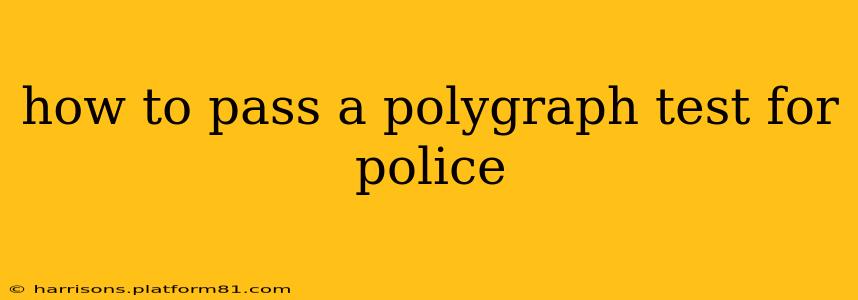How to Pass a Polygraph Test for Police: A Comprehensive Guide
Passing a polygraph test for a police application is crucial. While the accuracy and admissibility of polygraph results are debated, the test remains a significant hurdle in many law enforcement hiring processes. This guide provides information on preparing for the test, but it does not guarantee passing. The best approach is to be completely truthful and honest. Attempting to deceive the examiner is risky and could have severe consequences.
What is a Polygraph Test?
A polygraph, or lie detector test, measures physiological changes in the body, such as heart rate, blood pressure, respiration, and skin conductivity (sweat). Examiners interpret these changes in response to questions to assess truthfulness. The process involves several steps, including a pre-test interview, the test itself, and a post-test interview.
How to Prepare for a Police Polygraph Test
Preparation is key, even if you're telling the truth. Effective preparation focuses on mental and physical well-being:
-
Understand the Questions: The examiner will likely ask questions about your background, work history, and any potential issues that might disqualify you from police service. Knowing what to expect reduces anxiety. Practice answering honestly and calmly.
-
Get Enough Sleep: Being well-rested is crucial. Sleep deprivation can affect physiological responses, making it harder to pass.
-
Manage Your Stress: Stress can significantly affect the results. Practice relaxation techniques like deep breathing exercises or meditation in the days leading up to the test.
-
Avoid Stimulants: Avoid caffeine, nicotine, and other stimulants before the test, as they can alter your physiological responses.
-
Dress Comfortably: Wear comfortable clothing to help you relax.
-
Be Honest: This is the most crucial advice. Attempting to deceive the polygraph is highly risky and unlikely to succeed. The examiner is trained to detect deception.
-
Consult with an Attorney (Optional): If you have concerns about specific questions or your rights, you may choose to consult with an attorney.
What are the Types of Questions Asked During a Police Polygraph Test?
Polygraph tests usually involve several types of questions:
-
Irrelevant Questions: These are neutral questions designed to establish a baseline for your physiological responses. Examples: "Is your name John Doe?"
-
Relevant Questions: These address the key issues relevant to the investigation or your application. Examples: "Have you ever committed a felony?" "Have you ever used illegal drugs?"
-
Control Questions: These are broader questions that most people would likely answer "no" but might elicit a response if you're being deceptive. Examples: "Have you ever done anything dishonest in your life?"
Can You Beat a Polygraph Test?
While various techniques are claimed to help pass a polygraph test, none are guaranteed to work and attempting to deceive the examiner could lead to disqualification. Focusing on honesty and managing your stress is a far better strategy. The accuracy of polygraphs is continually debated, and some studies suggest they are not always reliable indicators of truthfulness.
How Accurate Are Polygraph Tests?
The accuracy of polygraph tests is a subject of ongoing debate among scientists and legal professionals. Some studies suggest a relatively high accuracy rate, while others argue that the tests are unreliable and susceptible to error. Factors such as the examiner's skill, the subject's stress level, and the specific questions asked can all impact the results. The admissibility of polygraph evidence in court also varies depending on jurisdiction.
What if I Fail a Polygraph Test?
Failing a polygraph test does not automatically disqualify you from a police position. However, it can significantly impact your chances. The examiner's report will be considered alongside other aspects of your application.
This information is for educational purposes only and should not be considered legal advice. Always seek professional guidance when dealing with legal matters. Remember, honesty and integrity are crucial traits for police officers.
